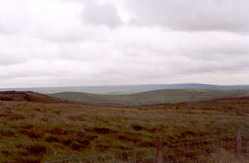The Smiths’ “Suffer Little Children” – Pop At Its Creepiest

I don’t get goose bumps very often. Occasionally I’ll be sitting at home some cool, quiet night with headphones on, listening to a song I love, and I will feel a quick wave of awe; my arms will tingle for a few seconds, then it will be gone. If I had more time to sit still, it might happen more often.
But sometimes it doesn’t have to wait for the right time.
It happened to me the other day, in fact, while I was driving home from work – on a hot day, maneuvering through traffic. And it makes sense, considering the song. It was The Smiths’ “Suffer Little Children,” possibly the creepiest pop song ever written. This song doesn’t endeavor to be morose like “Hurt,” or Halloweeny like “Black no. 1.” This song is unassuming, quiet, beautiful and innocent – and entirely haunting. Part of the reason has to do with what the song is about.
The last track on The Smiths’ first album is about a series of murders. Specifically, the Moors Murders, a string of extremely violent child killings that took place around Manchester in the ‘60s.
Between 1963 and 1965, Scottish stock clerk Ian Brady and his girlfriend, Myra Hindley, persuaded five children between the ages of 10 and 17 to follow them to various places, where Brady tortured and killed them. Hindley watched while Brady raped, hacked and strangled his victims with string or cord, nearly decapitating one of them. The couple then buried the corpses on a dreary field north of the A635 road, west of Oldham, called Saddleworth Moor. Four of the bodies were found over the next twenty years, one never was.
The thing that separates this song from other creepy tunes about death is that it isn’t exactly metaphorical. The names of the victims are in the lyrics, as is the name of one of the murderers. “John, you’ll never be a man / And you’ll never see your home again”; “Edward, see those alluring lights? / Tonight will be your very last night.” The song isn’t about the killings themselves, either -- it is actually sung from the voice of the dead children, assuring the killers that they will never rest. Hence its menacing chill.
Morrissey’s soft voice whispers, “We may be dead and we may be gone / But we will be right by your side / until the day you die, this is no easy ride.” The cold wind over the dark moor can almost be felt in the song’s haunting message to the killers: “You might sleep / But you will never dream.”
Your Daily Blend of Entertainment News
Adding to this monologue is the morbid reminder that by the time the song was released in 1984, two of the bodies had yet to be found. “Still a child cries, find me / Find me, nothing more.”
This gruesome narrative, delivered through Morrissey’s detached, mournful crooning and Marr’s soft, lullaby-like guitar strains, is more than enough to send a chill down even the most hardened spine. Try it for yourself: read the horrific account of the murders, see the faces of Brady and Hindley, stare at a photo of cold, dead Saddleworth Moor. Then listen to the song. If your spine doesn’t crawl out of your skin, I suggest you find a career where you can take advantage of those cast-iron nerves.
